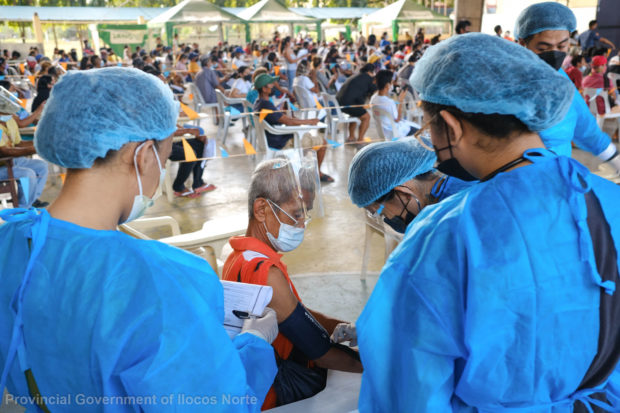
Healthcare workers assist a senior citizen get inoculated against COVID-19 in a vaccination facility in Laoag City, Ilocos Norte. (Photo courtesy of the Ilocos Norte provincial government)
MANILA, Philippines — The government will have to find other ways to convince the elderly to get immunized against COVID-19, if only to make them and members of their families and communities healthy and safe, the head of the National Vaccination Operations Center (NVOC) said on Monday.
Speaking at the Laging Handa public briefing, Health Undersecretary and NVOC chair Myrna Cabotaje said more than 2 million seniors nationwide remained unvaccinated despite the National Vaccination Days conducted last week, which saw only 3.45 million Filipinos, or 68.94 percent, of the target 5 million getting inoculated.
“We will change our strategies. We will intensify our advocacies because we know that many are very hard to convince to get vaccinated,” she said.
“It’s not vaccine hesitancy. Many just do not want [to get jabbed], they’re saying that they’ll be dying soon anyway,” she said when asked why many seniors were still unvaccinated.
“They don’t understand that if they get sick, their families will be affected. We have to speed up the process because we know that seniors don’t want many requirements. Let us bring the vaccines to them. Others are having a hard time going to faraway vaccination sites,” she added.
Another problem for the NVOC is how to sustain the vaccination drive in the Bangsamoro Autonomous Region in Muslim Mindanao (BARMM), the region with the slowest vaccination rate nationwide at 27 percent of its target population.
Cabotaje said many people got vaccinated during the mass immunization drive last week because of the “festive mood,” noting that vaccine hesitancy and cultural and religious beliefs might not be the reasons behind the previously low turnout after all.
She said the Department of Health (DOH) was talking with imams (worship leaders) and BARMM health and local government officials to discuss ways to improve vaccination coverage.
“They’re saying there’s hesitancy and [the factor of] religious beliefs but we say, why is there a high rate in Malaysia and Indonesia which are Muslim countries? What can we do more for BARMM? So, we are looking at sharing experiences. What did they do in Malaysia and Indonesia, which we can use to convince our citizens to get vaccinated?” she said.
The DOH official also lamented the lack of a sense of urgency among the fully vaccinated to get their booster doses, which was being complicated by the problem of vaccine preference with recipients wanting to get Pfizer and Moderna vaccines.
She said there was a need to push booster shot administration because only about a million of NVOC’s target of 3 million booster recipients last week got their jabs.
“They know the importance of vaccines, they know the importance of the booster but they don’t know about the urgency. They don’t want to [skip] work,” she said.
The DOH official said the NVOC was considering conducting the booster shot administration during weekends when many workers are off-duty.
New cases
Also at the Laging Handa briefing, the Metropolitan Manila Development Authority officer in charge, Romando Artes, confirmed that Metro Manila mayors would be meeting on Tuesday night to discuss whether to retain or lower the alert level 2 over the metropolis.
On Monday, the DOH reported 1,427 new COVID-19 cases, lower than Sunday’s 1,712.
The national caseload, according to DOH data, was now 3,653,526.
The DOH said there were 58,657 active cases, of which 53,326 were mild. The 3,269 recoveries brought the total number of survivors to 3,539,106 while the 79 fatalities raised the death toll to 55,763.
Meanwhile, the Inter-Agency Task Force for the Management of Emerging Infectious Diseases has approved the acceptance and recognition of the national COVID-19 vaccination certificates of Egypt, Maldives, Palau, Albania, Estonia, Greece, Malta and Uruguay for purposes of arrival quarantine protocols, as well as for interzonal and intrazonal movement.
The Commission on Elections (Comelec) has also dropped its face shield requirement for voters, finally accepting Malacañang’s policy since November on the voluntary use of face shields.
In its revised “new normal” manual dated Feb. 19, the Comelec said the use of face shields inside polling precincts during the May 9 elections would be voluntary in areas under alert levels 1 to 3.
—WITH A REPORT FROM DONA Z. PAZZIBUGAN
RELATED STORY
Gov’t to prioritize 3M unvaccinated seniors